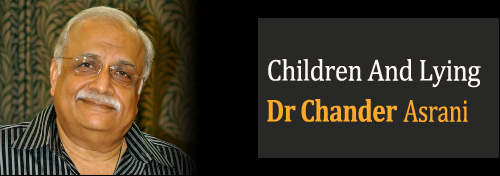Children And Lying
“R again lied today. God, I was so embarrassed!”
This was a mother of a seven-year old girl, who had very graphically described how her teacher slapped her repeatedly, which was proven to be a white lie after mother’s angry visit to the school principal & this was not R’s first lie! She seemed to be getting better at it!
Why does a child lie & How should we parents react?
Well, it depends on age and our understanding of the lie. In all scenarios, we have to keep a cool head and avoid the commonest knee jerk reaction – blaming the child or the other parent.
Few facts:
The purpose of this post is to help initiate a process of thinking as to why a child lies, apply it your specific scenario and then decide if any help is necessary in tackling the situation/behaviour.
– Children lie is a well-accepted fact. This is one skill they don’t need to be trained for. N, my 18 month old granddaughter, once came out of bedroom, went to the maid and demanded milk, innocently saying ‘Mamma sleeping’ when B, her mother was standing right behind her. Once she realized she was caught, she gave a sheepish smile and went and hugged B. Such self-serving lies are the first kind of lies many young kids try out.
– A lie of a child may be exaggeration of a fact, twisting the truth, hiding some fact (a child who has hit/pinched another child and knows that it is wrong, will never admit) and smart children manufacture stories (fantasy, aping grandma).
– In words of a child psychiatrist, “Very young kids don’t know the difference between truth and fiction.” Another one opined, “In fact, this type of lying can be a sign of good things”. “Preschoolers with higher IQ scores are more likely to lie,” says a professor of psychology. “Early lying proficiency may also be linked with good social skills in adolescence.”
This does not mean we ignore all lies or start feeling good about them.
Why does a child generally lie?
- If your child is lying about his capabilities he/she may actually be seeking more affection and praise to build self-esteem. The lie is actually his/her wishful thinking. Understand that!
- He may also lie out of fear of punishment. Physical punishment actually causes a child to lie more to avoid the punishment.
– Generally all kids experiment with lying especially between the age of 4-6 as part as their healthy development process; lying that occurs at an older age, in a repetitive manner and for no apparent reason is a cause of concern as it fits the category of ‘compulsive lying’.
– Lying as an indicator of something sinister – Compulsive lying, especially when accompanied by problem behaviours such as cheating, theft, unusual aggression, violent tantrums, missing school or constantly losing things etc. has often been indicated in the early stages of social behaviour disorders, i.e. Attention Deficit Hyperactive Disorder.
– It does not help to ask the child ‘why are you lying?’. In most cases he/she does not know. Some introspection is in order; have we innocently shown that lying for benefit is allowed! ‘Tell grannie that I am sleeping’ or seeing a friend’s incoming call ‘Tell her I am in bathroom’. After all a child learns best by experience and from the people he/she trusts!
How to prevent lying in the future?
– The bond between you and your child should be such that she/he can come to you with mistakes committed, without fear of anger and punishment. This encourages truthfulness in future. If you punish them for telling the truth, they will soon learn not to tell the truth.
– Don’t make matters worse – Most of us invite lying by asking a question that will get the child into trouble if answered truthfully. E.g. if a child has jam on his face and there is a broken jam bottle on the floor, don’t ask your child if he broke the bottle. You already know the answer.
Try to solve the problem instead of blaming the child. Say: “I see you broke the jam bottle. Come, we’ll clean it up. But be more careful in future; ask mom to open the bottle, you could have cut yourself up badly”.
– Use stories to explain to your child why lying is wrong and use the story “The Boy Who Cried Wolf”
– We always strive to attend to all needs of our children; Evaluate what is it that the child stands to gain/obtain by lying?
– Try to get the following few points across by communicating them to your child:
- When you lie you risk losing the other person’s trust and this trust is difficult to rebuild.
- Lies are always revealed at the end.
- We will always love you and accept you no matter what, provided you are being honest with us.
– Consider getting professional help for your child if:
- He/she appears stressed.
- Tells you he/she has been physically or sexually abused and you wonder if it is a lie. Don’t assume that it is a lie; young children typically do not have the knowledge or words to lie about being abused but older ones may have.
If you notice frequent lying, act on it strongly and immediately, it is just too important to ignore.
You are the expert when it comes to your family and child. If you have a concern, trust your instinct and find someone trained to help you: your family physician, school counselors or consultants.
Dr Chander Asrani, father to three daughters and grand father to one, is a post graduate in Family Medicine. He has over 35 years in clinical practice, launched www.growingwell.com in 2000 and since then has been writing on various subjects. Know more about him at about.me/drasrani.

